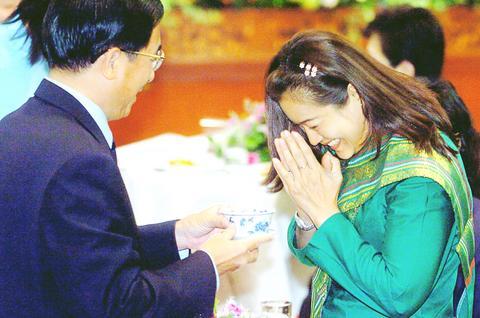The Presidential Office yesterday invited outstanding mothers from different ethnic groups for afternoon tea, in celebration of international Mother's Day. President Chen Shui-bian (
The gathering symbolized the theme of ethnic harmony, with guests including mainlander spouses, Aboriginal women, Hakka women, single mothers, working mothers and mothers of mentally and physically handicapped children.
One of the mothers, from the Bunun Aboriginal tribe, performed a blessing of all mothers, while another mother from a community struck hard by the 921 earthquake sang a traditional Taiwanese song, The Spring Wind, asking that the government do more for mothers caring for handicapped family members at home.

PHOTO: SEAN CHAO, TAIPEI TIMES
The president said in his speech that the government had already finished drawing up plans for a public daycare system. He encouraged more private sector companies to establish daycare centers to ease the burdens of the modern mother.
He also said that because of the increasing number of foreign brides from China and southeastern Asia, it is becoming important to accept and be supportive of these women and of Taiwan's emerging new cultural identity.
`A Son of Taiwan'
"My experience of success is a story of `a son of Taiwan' and now all women, even those foreign brides, could serve as mothers of `sons of Taiwan,'" he said.
"We should respect and cherish the diversity of Taiwan's culture and people and show them more tolerance," Chen said.
The president also promised to improve the government's welfare policies for mothers.
Chen expressed concern for certain groups of mothers, saying that, as their families' only source of financial and emotional support, it was difficult for single mothers to raise their children.
Many women who recently immigrated to Taiwan have trouble supporting themselves financially due to language and other problems, he said.
These women are often left by their husbands without income or support and even more helpless than before, Chen said, and are the newest minority group in Taiwan.

‘DENIAL DEFENSE’: The US would increase its military presence with uncrewed ships, and submarines, while boosting defense in the Indo-Pacific, a Pete Hegseth memo said The US is reorienting its military strategy to focus primarily on deterring a potential Chinese invasion of Taiwan, a memo signed by US Secretary of Defense Pete Hegseth showed. The memo also called on Taiwan to increase its defense spending. The document, known as the “Interim National Defense Strategic Guidance,” was distributed this month and detailed the national defense plans of US President Donald Trump’s administration, an article in the Washington Post said on Saturday. It outlines how the US can prepare for a potential war with China and defend itself from threats in the “near abroad,” including Greenland and the Panama

A wild live dugong was found in Taiwan for the first time in 88 years, after it was accidentally caught by a fisher’s net on Tuesday in Yilan County’s Fenniaolin (粉鳥林). This is the first sighting of the species in Taiwan since 1937, having already been considered “extinct” in the country and considered as “vulnerable” by the International Union for Conservation of Nature. A fisher surnamed Chen (陳) went to Fenniaolin to collect the fish in his netting, but instead caught a 3m long, 500kg dugong. The fisher released the animal back into the wild, not realizing it was an endangered species at

The High Prosecutors’ Office yesterday withdrew an appeal against the acquittal of a former bank manager 22 years after his death, marking Taiwan’s first instance of prosecutors rendering posthumous justice to a wrongfully convicted defendant. Chu Ching-en (諸慶恩) — formerly a manager at the Taipei branch of BNP Paribas — was in 1999 accused by Weng Mao-chung (翁茂鍾), then-president of Chia Her Industrial Co, of forging a request for a fixed deposit of US$10 million by I-Hwa Industrial Co, a subsidiary of Chia Her, which was used as collateral. Chu was ruled not guilty in the first trial, but was found guilty

DEADLOCK: As the commission is unable to forum a quorum to review license renewal applications, the channel operators are not at fault and can air past their license date The National Communications Commission (NCC) yesterday said that the Public Television Service (PTS) and 36 other television and radio broadcasters could continue airing, despite the commission’s inability to meet a quorum to review their license renewal applications. The licenses of PTS and the other channels are set to expire between this month and June. The National Communications Commission Organization Act (國家通訊傳播委員會組織法) stipulates that the commission must meet the mandated quorum of four to hold a valid meeting. The seven-member commission currently has only three commissioners. “We have informed the channel operators of the progress we have made in reviewing their license renewal applications, and